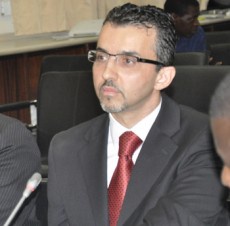It is becoming clear that the African Automobile Limited (AAL) demand for the payment of $1.5billion from the Ghana government for the alleged abrogation of contract for the supply of 110 Hyundai Gallopers cross country vehicles to the Ministry of Local Government and Rural Development was an attempt to fleece the country.
Government officials including ministers have jumped to the defence of the auto company, justifying the claim.
However, the Parliamentary Hansard, dated November 8, 2001, has revealed startling facts that may turn the tables against African Automobile Limited.
The report made available to DAILY GUIDE shows that AAL may rather owe the Government of Ghana millions of dollars in refunds and interest payments as the New Patriotic Party (NPP) administration, under President Kufuor, wrote to the company informing it of the abrogation of any agreement to supply Hyundai Gallopers to the state.
Demand For Refund
In 2001, the Kufuor-led NPP stopped the Galloper deal and demanded a refund totaling over $800,000 which the company had already been paid.
Indeed, if interest calculations are made on this outstanding amount, AAL could be liable to pay Ghana millions of dollars as against the $1.5billion being trumpeted by Deputy Information Minister Samuel Okudzeto Ablakwa.
The report captured comprehensive submissions from the then Minister of Local Government and Rural Development (MLGRD), Kwadwo Baah-Wiredu (of blessed memory), on the floor of Parliament in November 2001.
Mr Baah-Wiredu explained to the House how this outstanding amount came about upon an urgent question asked by Emmanuel Adjei Boye, former MP for Krowor in the Greater Accra Region.
According to Mr Baah-Wiredu, upon the initial agreement, the government paid ¢13 billion (the equivalent of about $ 2.5 million at the then prevailing exchange rate of one dollar to ¢5,200).
The money was paid between January 21, 2000 and November 2000. It was part payment for the 110 Gallopers and a subsequent request for some sanitation equipment from AAL.
The eager AAL consequently promised to make delivery of about 60 vehicles by October 9, 2000.
But instead, the company supplied only 23 Gallopers, under the agreement that it would supply the remainder within two weeks. “This promise was not fulfilled, as at today (November 8 2001). The company had supplied only 23 vehicles out of the 110 vehicles ordered,” said the minister.
The 23 vehicles that were supplied at the time were promptly allocated to about 23 District Assemblies. However, discouraging reports of the vehicles’ performance inundated the Ministry.
The District Assemblies complained bitterly about the functionality of the vehicles, the main complaints including the fact that the vehicles were prone to breakdowns. The Gallopers were also dismissed for not being conducive for the harsh terrains in the Districts. Only three of the vehicles did not register any perceptible problem at the time it was used, Baah-Wiredu stated.
Apparently, this realisation forced the then NPP government to rethink the Gallopers deal.
On the afternoon of November 8, 2001, the deceased minister told Parliamentarians that realizing the negative reports on the Gallopers, AAL conceded its shortcomings and proposed to replace the Gallopers with Mitsubishi Pajero Cross-country vehicles.
“It is interesting to note that in a letter dated October 15, 2001, Messrs African Automobile wrote to me saying that they had accepted to supply Mitsubishi Pajero cross-country vehicles instead of the Galloper,” he told the MPs.
Abrogation of Galloper Deal
Submissions captured in the Hansard shows that on September 28, 2001, the Ministry of Local Government eventually wrote to abrogate the contract with AAL. The order took effect on September 28, 2001.
“In addition, the ministry requested the company to refund to the Ministry of Local Government and Rural Development by October 15, 2001 the total deposit of ¢13 billion, less the cost of the Gallopers already supplied. And then they have to pay the appropriate interest on the outstanding balance,” he explained.
When computed at a cost of $30,200, Gallopers, (according to Baah Wiredu’s predecessor, Kwamena Ahwoi, each Galloper cost that much), the total cost of the 23 Gallopers supplied to the government at the time of the contract abrogation would amount to about $609,000 (¢3.6 billion).
Within the same time, the ministry had also made the payment of ¢5 billion for the supply of the sanitation equipment which AAL failed to supply.
Total prepayment to AAL at the time peaked at ¢13billion, a summation of the prepayment for the 23 Gallopers and the sanitation equipment put the value at about ¢8.6billion. Deduction therefore would put the refund demanded by the Government of Ghana at approximately ¢4.6 billion or $884,615.
It is unclear if AAL ever made the refund before the NPP government was defeated in 2008 by the Mills-led National Democratic Congress (NDC).
The Galloper deal was recently resurrected by the Deputy Minister of Information, Samuel Okudzeto Ablakwa who disclosed that Ghana might incur a whopping $1.5billion judgment debt for an alleged negligence in the AAL transaction.
He was quick to blame the NPP government for the negligence.
According to him, even though the Gallopers were imported by the previous NDC, when the NPP government came to power in 2001, it ignored outstanding contractual agreements between the government and AAL; hence incurring a one percent monthly interest charge on the vehicle with accompanying demurrages.
However, the NPP has debunked the claim, saying that the contract was not a “conventional” contract.
The Mills government officials have strongly defended the claim of AAL and are in the process of negotiating the claims down to about $500 million.**
General News of Friday, 20 July 2012
Source: Daily Guide
Stinking $1.5bn Galloper Deal: The Inside Story

















